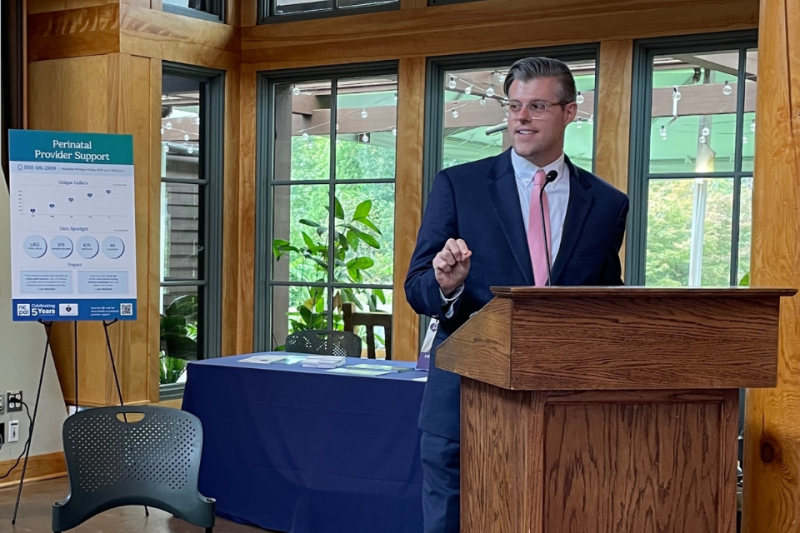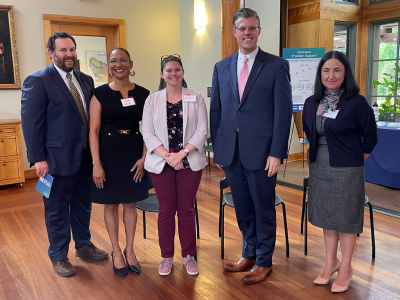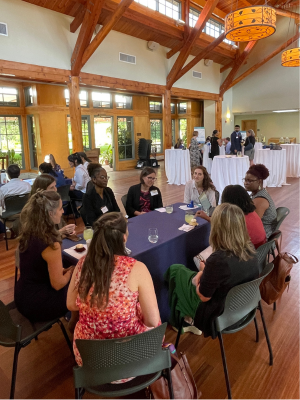
Amidst an unprecedented behavioral health crisis in North Carolina and across the country, the North Carolina Psychiatry Access Line (NC-PAL) has been working to expand access to behavioral health care to children and others throughout the state.
NC-PAL leaders, staff, and partners—including Kody Kinsley, North Carolina’s Secretary of Health and Human Services—gathered at a special event at Sarah Duke Gardens on Wednesday, September 20, to celebrate the program’s five-year anniversary.
NC-PAL offers free telephone consultation and education to help health care providers address the behavioral health needs of pediatric and perinatal patients. The program has reached providers—and ultimately, patients and families—in well over half of the 100 counties in the state, fielding more than 3,400 calls to the pediatric phone line from 61 counties and more than 1,800 calls to the perinatal phone line from 46 counties.
NC-PAL also provides mental and behavioral health training and consultation to leaders and staff at public schools across North Carolina. During the 2022-2023 academic year, NC-PAL served 130 schools.
The program is a collaboration between Duke University’s Psychiatry & Behavioral Sciences, the North Carolina Department of Health and Human Services (NCDHHS), and the University of North Carolina at Chapel Hill School of Medicine. NC-PAL is supported by the Health Resources and Services Administration of the U.S. Department of Health and Human Services, NCDHHS, and North Carolina Medicaid.
Celebrating a Milestone
In his comments at the event, NC-PAL co-principal investigator Gary Maslow, MD, MPH, an associate professor of psychiatry and behavioral sciences at Duke, said the program began to take root during a brief conference call with colleagues in 2017, when he jotted down initial ideas about potential partners and strategies on the back of a prescription pad.
“This is a phenomenal accomplishment. The reason why is because it foresaw the growing need for increased access to care, especially among our children in North Carolina with regard to psychiatric support.”
— Kody Kinsley

Now, five years after NC-PAL’s launch, Kinsley praised Maslow and his co-PI, Nicole Heilbron, PhD, also an associate professor of psychiatry and behavioral sciences at Duke, on recognizing and acting on the opportunity to develop the program: “This is a phenomenal accomplishment,” he said. “The reason why is because it foresaw the growing need for increased access to care, especially among our children in North Carolina with regard to psychiatric support.”
Kinsley noted that we face “some of the greatest workforce challenges in our healthcare space in a generation if not longer,” and that addressing those needs will require “creative solutions that can scale to meet that demand in a different way than just trying to mint more psychiatrists or more providers period.”
One of the creative ways NC-PAL is addressing the behavioral health crisis across the state is by supporting K-12 school staff in helping students with mental and behavioral health concerns.
“We are committed to meeting kids where they are, and they are at school,” remarked Yvonne Copeland, the director of the Division of Child & Family Well-Being at NCDHHS. “We have a ratio that is woefully under-benchmarked when it comes to behavioral health professional or clinician to student ratio, so this is really a huge extender for us—equipping school health personnel with information and capacity that they don’t have and wouldn’t be able to have.”
Another speaker—Shauna Guthrie, MD, president of the North Carolina Academy of Family Physicians and owner of Sunflower Direct Primary Care in Henderson, NC—shared her experience with NC-PAL. Guthrie was among NC-PAL’s first callers and continues to use the consultation line regularly.
“My knowledge has expanded so much from those phone calls because they don’t just give you the answer, they tell you why and talk you through their experiences with different patients. And that’s so valuable in a rural area where we don’t have access to child psychiatry.”
— Shauna Guthrie, MD

“One of the amazing things about the program is not just the timeliness with which you get information to help children and families, but you learn while you’re doing it,” she reflected. “My knowledge has expanded so much from those phone calls because they don’t just give you the answer, they tell you why and talk you through their experiences with different patients. And that’s so valuable in a rural area where we don’t have access to child psychiatry.”
Throughout the event, attendees visited exhibit tables and talked with NC-PAL staff about different aspects of the program and how they could get involved or deepen their engagement. The celebration wrapped up with lively small group conversations about how NC-PAL could help foster health equity in North Carolina.
Feature image caption: Kody Kinsley, Secretary of the North Carolina Department of Health and Human Services, shares remarks at the NC-PAL five-year anniversary celebration.